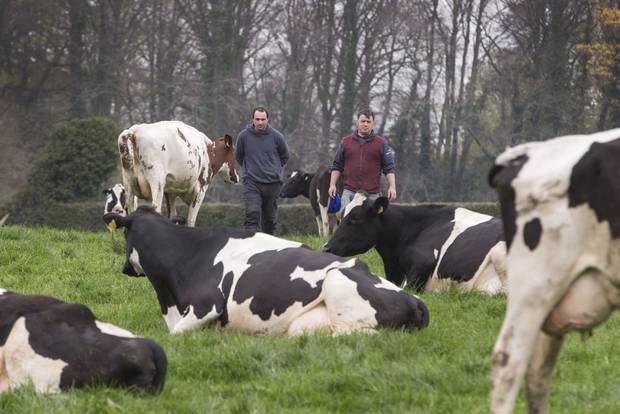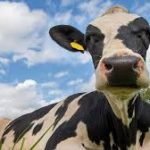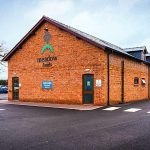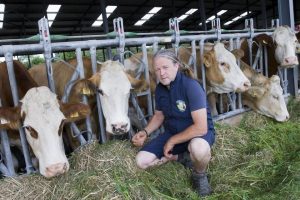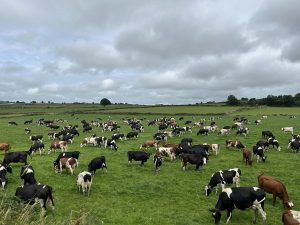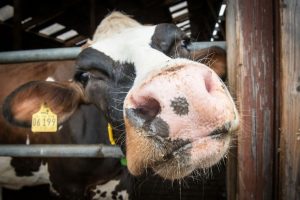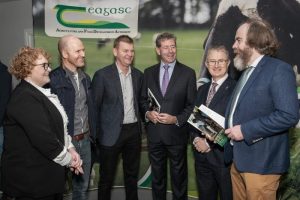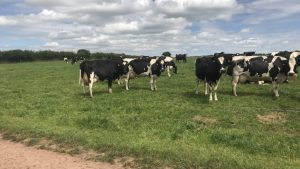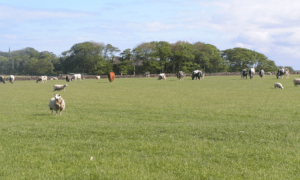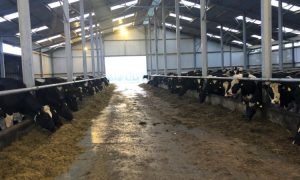
Tucked away and almost hidden behind the walls of the Phoenix Park, under the watchful gaze of Farmleigh Clock Tower, the Guinness dairy herd at Knockmaroon is believed to be the last within the M50.
However, the 90-strong Holstein Friesian herd’s days chewing the cud in Castleknock are numbered. Kieran Guinness and the Knockmaroon farm management team have decided to sell off the herd and focus instead on maintaining and building up their mixed drystock enterprise.
With 21 hectares under use, dairy manager Peter Taaffe says the farm – which milks 50 cows in the winter and 40 in the spring – is already “maxed out”. Expansion isn’t a viable option on a site that is already under pressure from ever-increasing urban sprawl.
“We looked at different things here along with the family and you’ve nine blocks of land here,” says Peter, who is from a beef farming and tillage background in Curraha in Co Meath but has been working and living at Knockmaroon since he was made manager in 1994.
“Every day we are on the road with a tractor and trailer. This is Castleknock. It’s a very busy area and only 500 yards from the Phoenix Park. Trying to get the milk lorry up here can be a nightmare in the mornings because the road is like a car park with all the traffic.
“We have two hectares across the road and have to move the cows. It takes four of us to move the cows – often there would be no cars on the road but the minute we decide to move them the place would be full of them.”
While Peter was happy with the milk price received from Glanbia last year, he admits that the farm’s liquid milk quota “isn’t strong enough” and that switching to total spring production didn’t make sense for the type of cow and farm facilities they have.
“Our liquid quota of 450 litres a day is not good enough,” explains Peter, who works alongside fellow dairy manager Barry Clarke from Dunshaughlin. “There would be about €100,000 to spend on the yard between tanks and other things, and the way the milk is in the winter time here, going forward to invest that type of money wouldn’t make sense.
“We’re better off getting out of it now because the dairy industry is a vulnerable one to be in.
“We were lucky we got our bull calves sold in January for €130/hd but trade went down then so we decided to rear the rest ourselves, so hopefully that will work out.”
Peter lives on a cottage on the farm with his wife Ann and two children – Cathal, who is studying agricultural science in UCD, and Orla, who is in fifth year at Castleknock Community College.
He says the farm has given them a great life and insists that it’s not the end of an era as he will continue to drive on the farm’s drystock herd.
“We have about 150 cattle made up of some Angus, Whiteheads and Friesians,” he says. “We’ll keep what we have and expand a bit, we won’t overstock either. We want to keep it to a small number and we’ll talk to Teagasc as they might have different plans that we can look into.”
Knockmaroon Farm has been in operation since the 1800s, when it was purchased by the Guinness family. It always kept a herd of Ayrshire cows but when BSE struck in 2001 and depopulated the herd, they fully switched over to Holsteins.
“We started from scratch and bought cows six months again after that,” says Peter. “We got up to 60 cows and pushed it on the last couple of years. There are great opportunities there to expand for some farms, but we did all we could do.”
Peter says the addition of Barry to the farming team for the last 10 years has been a great help and would “recommend any lad farming on his own” to take on a young member of staff to motivate them.
“We’re very lucky to have Barry,” he says. “He has driven me on a bit more. He is only in his mid-20s and is on Twitter and sees modern things and brings modern ideas because that is the way farming is going.Sometimes we lock horns but it works well and makes sure we don’t stay stuck in a rut.”
With a heavily stocked and stringent paddock rotation system moving every 12 hours and few options for reseeding, Peter acknowledges that last summer’s drought “really tested” the farm.
“It was like getting out of a plane in Lanzarote here, we were burned up from June to the end of September,” he says.
“We had no grass and we used winter forage the whole way through. It was tough, although it was enjoyable to get up in the morning with the sun shining instead of working in the rain all the time.
“It was better than the rain but it was tough going feeding cows and trying to keep mastitis under control but we got by.”
Last year the cows produced 6,040kg of milk solids and will go up for auction next month along with about 40 young stock including calves and in calf heifers.
“The morning we took the cows’ pictures here for the auction – we were proud as punch of them because they looked really well, with big veiny udders. We were thrilled,” says Peter.
“We have a few bangers that have always been hanging around that we will keep and dry off and probably kill them off later in the year. We’ll give it a shot and see how it goes.”
While the farm was profitable enough for two employees to make a wage, Peter says he is excited about the new era that the long-standing farm will enter in the coming weeks. He feel it’s important that farmers know the right time to bow out.
“I’ll be 60 in 10 years and this farm isn’t like any other farm out there,” he says.
“You have to look at the big picture. It’s nice to make the decision. We’re hoping the drystock might suit us better.
“We know there’s a lot getting out of cattle but maybe that makes it the right time for us to go in to it.”
Milking Lorry
The estate has been in the Guinness family since the 1800s, with his grandfather Walter Edward Guinness – a great-great grandson of Arthur Guinness, who established the brewery – acquiring the estate in Castleknock in the early 20th century. But with the swelling city suburbs making the prospect of expansion on Knockmaroon’s dairy herd next to impossible, Kieran (pictured) says it makes sense for them to now offload the cows.
“There’s nobody milking in Dublin any more. Getting a milk lorry in to the yard was a nightmare,” he says. “It’s great that the drystock will keep the place going, but it’s very difficult there at rush hour and the city isn’t part of farming any more.”
Walter Guinness, the first Lord Moyne, was assassinated near his home in Cairo during World War II by a Jewish militant group, and it was up to Kieran’s father Bryan to tend to the farm in Knockmaroon.
Kieran has fond memories of life on the farm with his 10 siblings and of his father milking cows by hand.
“I remember my father milking cows in the late ’50s. We kept Ayrshires back then. We always had a real interest in the farm,” says Kieran, who also runs a successful stud farm and rears a mixed breed herd of cattle in Moyvore, Co Westmeath.
Indo Farming
